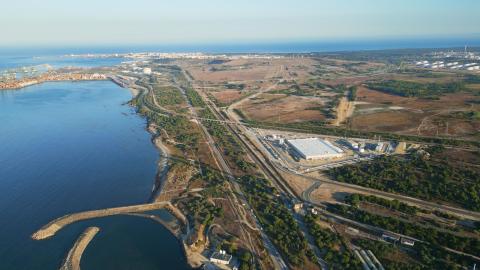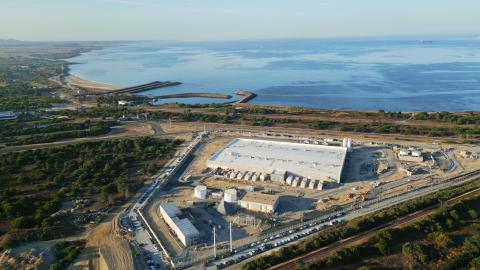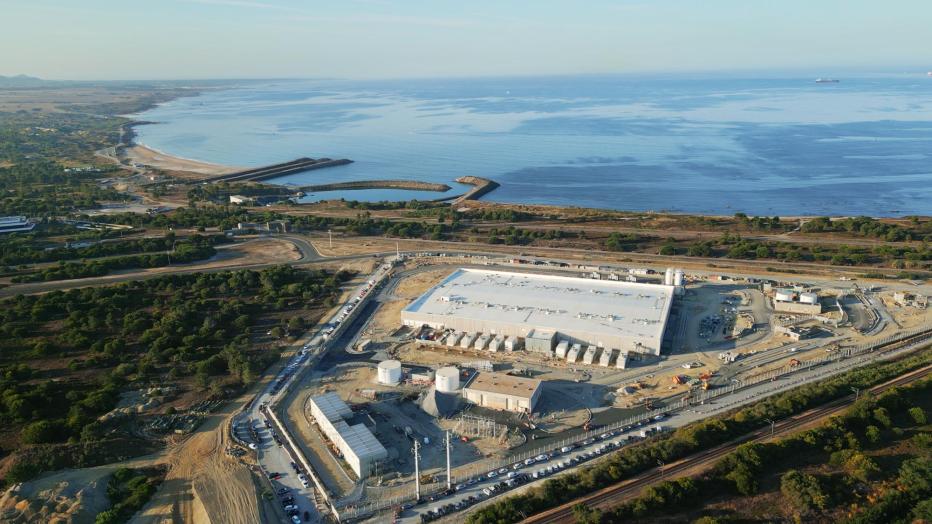SINES DC by Start Campus
Putting sustainability at the heart of data center design
-

Images courtesy of Start Campus
-

Images courtesy of Start Campus
The $9.4 billion (€8.5 billion) SINES DC Campus developed by Start Campus (owned by U.S.-based Davidson Kempner and U.K.’s Pioneer Point Partners) is set to deliver a 1.2 GW IT facility with industry-leading sustainable credentials. Powered entirely by renewable energy, the campus features a state-of-the-art seawater cooling system, that leverages the ocean as a natural heat sink, achieving a Water Usage Effectiveness (“WUE”) of 0 – addressing a critical resource challenge faced by data centers worldwide.
Strategically located in Sines, Portugal, at Europe’s westernmost edge, the campus will connect three continents through high-speed subsea cables. Capitalizing on Portugal’s unique position as the only country in the world with direct submarine cable connections to around 60 countries.
Drawing on our global experience and deep domain knowledge in delivering sustainable, innovative solutions for the digital economy, we are designing this “green giant” to deliver data using 100% renewable energy.
“Meeting the demands of a thriving, digitally enabled economy requires resilient, sustainable data. Powered entirely by renewable energy, SINES DC sets a new standard for data center design – one that contributes positively to the economy and society while respecting the environment.”
Reducing data centers’ environmental footprint with a mega-project that is sustainable by design
As industries rapidly pivot to digitalization and virtualization, data centers are becoming increasingly central to how we work and live. Traditionally, these mission-critical facilities have relied on a power-heavy designs to maximize processing capacity and minimize downtime. However, achieving sustainability and carbon neutral goals requires a fundamental shift in how data centers are designed and delivered.
Leveraging the brainpower of more than 60 designers, engineers, power and energy specialists and environmental teams across the U.S., Ireland, India, Italy, Poland, Singapore and the U.K. — alongside local partners in Portugal, Prospectiva, LMSA and PGI — we are drawing on our globally integrated delivery approach and our subject matter experts’ deep expertise to craft the SINES DC campus. This globally integrated approach, with carbon neutrality at its core, sets a new benchmark for sustainable data center design. The campus will achieve Net Zero by 2030 through cutting-edge sustainable design. This includes repurposing the existing ocean water intake and outtake infrastructure from a former coal-fired power plant to create a state-of-the-art ocean-water cooling solution and sourcing 100% renewable power from Portugal’s robust renewable energy portfolio.
The first phase, SIN01, became operational in 2024 with its first 14 MW, serving as a proof of concept for prospective clients transitioning to larger spaces in the campus’s subsequent data center buildings (SIN0206) which range from 190 to 220 MW each.
Beyond its technological achievements, the SINES DC campus will serve as a socio-economic pillar for the region, creating an estimated 9,000 jobs, and revitalizing a former industrial area. By 2030, the campus is projected to contribute approximately 1% of Portugal’s GDP with a total capacity of 1.2 GW across six buildings.

Video courtesy of Start Campus
-
100 %
The percentage of renewable energy that will power the SINES DC campus
-
5
The number of continents that the campus will serve directly via high-speed subsea cables
-
1.2 GW
Upon completion, the total project’s IT capacity, with fully secured power in place today
-
1.1
Design PUE, achieved through highly efficient cooling solution
-
0
Design WUE, using but not consuming ocean water, setting new precedents in the industry
About data center design at Jacobs
We embed sustainability into data center design to help clients achieve their carbon-neutral objectives while positively impacting the environment. Our approach balances operational reliability and the need for speed to market. Jacobs has designed and delivered state-of-the-art data center projects that prioritize innovative approaches to sustainability and energy efficiency.
Did you know?
- According to the International Energy Agency, data centers consume approximately 220-320 terawatt-hours of electricity, accounting for about 0.9 – 1.3% of global electricity demand.
- Data centers and data transmission networks also account for nearly 1% of energy-related greenhouse gas emissions worldwide.
- The 2024 United states Data Center Energy usage report by the Lawrence Berkeley National Laboratory reported that hyperscale data centers are expected to consume between 60 and 124 billion liters of water in 2028, up from 21.2 billion liters consumed in 2014.
- Ranked No. 1 by Engineering News Record in Data Centers for five years in a row, Jacobs leads efforts to reduce energy consumption and advance sustainability.
- Over the past decade, Jacobs has delivered over 30 million square feet of data center space and 5,000 MW in power demand, representing over $40 billion in construction value.
“To power our economy, we need data capacity. To keep our planet healthy, we need to minimize the impact on the environment. To strike this balance, we implement energy-efficient technologies that pull from renewable energy sources and adopt eco-friendly practices across all data center design, building operations and construction.”














































